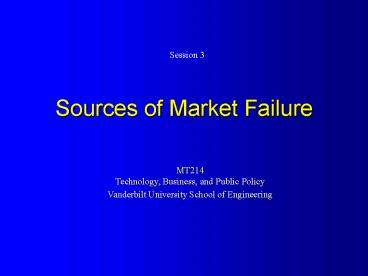Sources of Market Failure
1 / 20
Title: Sources of Market Failure
1
Sources of Market Failure
Session 3
MT214 Technology, Business, and Public
Policy Vanderbilt University School of
Engineering
2
The Perfectly Efficient Market(a theoretical
ideal)
- Many buyers and sellers
- No buyer or seller is a price maker
- Products are interchangeable
- No transaction costs
- No entry or exit costs
- Perfect, universal knowledge among buyers and
sellers
3
Departures fromPerfectly Efficient Markets
- Deviation from Economic Ideal
- Deviation from Social Ideals
4
Deviation from Economic Ideal
- Insufficient Competition (too few competitors)
- Information Deficiencies
- Externalities (negative and positive)
- Public Goods
- High Entry Barriers
- Mobility Barriers
5
Insufficient Competition
- Ideal
- Many competitors
- Free entry and exit (perfect mobility)
- Deviations
- Monopolies
- Oligopolies
- Examples?
- Local utilities
- Microsoft
- Air carriers (?)
6
Insufficient Competition (ctd)
- Causes
- Tight patent protection
- Natural monopolies
- Presence of scale economies
- Increasing returns markets
- Results
- Overpricing
- Mediocre products and service
- Fewer choices for consumers
- Reduced incentives for efficiency, innovation
7
Information Deficiencies
- Ideal
- All parties have complete perfect knowledge
- Deviation
- One party has more relevant information
(information asymmetries) - Nobody has sufficient information
- Examples
- Information asymmetries
- Used cars
- Information deficiencies
- Many high-tech products
- Prescription drugs mechanism of action unclear
Back to Deviations from Economic Ideal
8
Information Deficiencies (ctd)
- Causes?
- Inexperienced buyers
- New or poorly understood products
- Lack of full disclosure
- Results
- Suboptimal decisions
- Less profit (often for both parties)
Back to Deviations from Economic Ideal
9
Externalities
- Ideal
- Price paid by buyer covers all product costs
- Producer reaps all social rewards of product
- Deviations
- Negative externalities
- Positive externalities
Back to Deviations from Economic Ideal
10
Negative Externalities
- Costs that arent incurred by the parties (social
costs) - Examples
- Pollution
- Over-fishing
- Airport congestion
- Causes
- (Often) Scarce/finite (inelastic) resource
- Presence of prohibitive transaction costs
- (e.g., policing compliance, collecting fines)
- Results
- Overproduction
- Underpricing
Back to Deviations from Economic Ideal
11
Positive Externalities
- Rewards that the producer doesnt fully reap
- Examples
- Any productive activity that is taxed
- Scientific research (often)
- Digital content whose dissemination cant be
controlled - Causes
- High transaction costs
- Low enforceability of property rights
- Results
- Underproduction
- Reduced innovation
Back to Deviations from Economic Ideal
12
Extreme Case of Positive Externalities Public
Goods
- Ideal
- Every consumer pays full cost of product
- Deviation
- Large class of users pays little to none of the
cost - Examples
- Pure Public Good defense, space exploration
- Quasi-Public Good education, libraries, social
programs
Back to Deviations from Economic Ideal
13
Public Goods (ctd)
- Causes
- Nonexcludability (free riders)
- Imperfect pricing mechanisms
- No mechanism to get consumer to pay for the
benefit - Result
- Private markets under-produce or dont produce
14
High Entry Barriers
- Ideal
- No entry or exit costs
- Deviation
- Entry costs exclude all but the best-financed
firms - e.g., pharmaceuticals, car rental, long distance
telecom (formerly!) - Entry costs preclude entry entirely
- e.g., space program, nuclear power
- Causes
- Unacceptable or insurmountable entry scale, risk
or time horizon - Result
- Insufficient competition
- Private sector doesnt produce
Back to Deviations from Economic Ideal
15
Mobility (entry/exit) Barriers
- Ideal
- No barriers to the mobility of products, ideas,
labor, or capital - Deviation
- Trade barriers (tariffs, quotas)
- Immigration restrictions (quotas)
- Currency/capital controls (e.g., foreign
ownership caps) - Causes
- Protectionism
- Historical traditions (e.g., separate European
currencies) - National security concerns (weapons, high-tech
products) - Result
- Higher costs, factor shortages, depressed
economic activity
Back to Deviations from Economic Ideal
16
Deviation from Social Ideals
- Recognition that even perfectly efficient markets
dont produce certain benefits to which people
are entitled - Categories
- Morally objectionable exchanges
- Socially important goods
- Procedural fairness
- Distributive justice
17
Morally objectionable exchanges
- Examples
- Victimless crimes
- Illicit drugs, prostitution
- Sale of body organs, babies
- Stem cell research (?)
18
Socially important goods
- Goods that arent produced in sufficient quantity
by the private sector - Examples
- Telecommunications
- universal access
- Internet in every public school
- Medical care
- Access to prescription drugs by Medicare
recipients
19
Procedural Fairness
- Civil rights
- Equality of opportunity vs. pure meritocracy
- Quotas
- ADA, age discrimination laws, etc.
- Equity vs. Efficiency
- Procurement regulations favoring small businesses
20
Distributive Justice
- Equality of Result
- Examples
- Executive compensation
- CEO vs. Assembly Worker
- U.S. 5001
- Europe 201
- Labor costs U.S. vs. Offshore
- (Who objects?)































